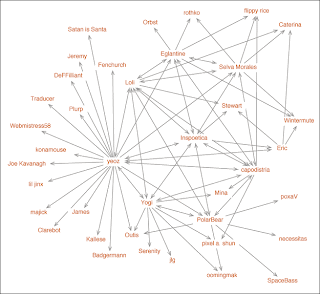A lot of early writing about digital environments worked through the idiom of 'cyberspace'. Cyberspace -- a word coined by author of Neuromancer and all-around badass William Gibson -- is one of those slippery words you come across quite often when people talk about digitial technologies and new media. It means a lot of things to a lot of people, but generally, if you hear someone talking about cyberspace, they're talking about the sphere of activity created by communications technologies, specifically activity on the internet. Cyberspace, as a term, has fallen out of vogue, but virtual space comes up with relative frequency, and so is still worth addressing, I think.
Why do we hear so much about virtual space and not about virtual place? It seems to have something to do with the slippage in meaning between place and space. Places are not just bounded portions of space. Rather, they are spaces that are imbued with meaning. What makes a place a place is it's specificity, not only in geography but also in networks of meaning and imagination. Our homes and schools are places only insofar as they carry with them our memories and interactions. Without these associated meanings, they fall into the category of locations. Without names or meaningful structures, they become simply portions of space.
Transferring this distinction to the realm of the virtual, it is easy to understand what we mean by virtual space, and even by virtual location. Virtual space (or spaces) are bounded only by the fact that they exist within the sphere of the virtual. Virtual locations are denoted by URLs and website infrastructures. But what is a virtual place?
One of the easiest ways to think about virtual place is in the context of video games/virtual worlds, like World of Warcraft and Second Life. These environments recreate our experience of place by mimicking the aspects of place that we rely on in the real world -- landscapes, buildings, neighbourhoods, etc, are used to denote this place from that. But if our notion of place in the virtual world is restricted solely to digitally rendered environments, then it is sorely lacking in its ability to adequately describe all aspects of online experience.
A better example of what I mean when I talk about a virtual place over a virtual space is the interlocking places and sites that make up media fandom. Sites like Fandom Wank, Metafandom, and the various archives, LiveJournal communities, personal journals and message boards that see a variety of fannish activities take on the role of places, rather than simply locations. They are places that attract certain types of people, certain modes of conversation, and carry with them particular histories that embed them in networks of meaning that extend through time. But they don't have the traditional markers of place -- all of the geographical, topographical, and architectural touchstones that we use to describe or delineate one place from another. How can we represent virtual place to ourselves and to others, for whom the place may be simply a location, or an unbounded part of cyberspace? How does thinking through the difference between virtual space and virtual place allow us a more nuanced understanding of what online communities and interactions look like?
These questions point towards a need for internet-centered research that focuses on the historically-sensitive nature of virtual communities, and the places they make for themselves. We need a new vocabulary in order to talk about digital infrastructures -- what makes some online spaces more amenable to "place"-ification than others? But we also need a new language to talk about virtual communities. All too often the language of networks dislocates online communities from their spatial and temporal settings. Representations of online communities too often look like this:
These types of images tell us about connections between people, but not abut connections between people and the places they occupy and make meaningful to themselves and their communities. We need to come up with better ways of describing, studying, representing, and building virtual places if we are going to come to a fuller understanding of what virtual communities and relationships look like. We need better ethnographies of the virtual, and better anthropologies of the digital. Over the last decade we've come to understand that the virtual does not transcend or erase the body, despite the predictions of (mostly white, mostly male) digital utopians. But neither does the virtual transcend the historical or the spatial. If we are going to talk about the Internet in a way that makes sense for people who have real relationships and real attachments to online communities, we need to develop a conceptual vocabulary that acknowledges and upholds the placefulness, rather than the spaciousness, of the virtual world.


1 comment:
Nice text! I think this contribute for the debates about internet and society.
Post a Comment